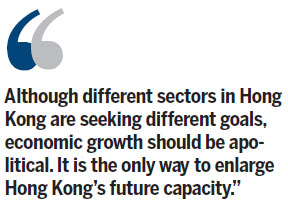Where can Hong Kong reclaim more land for development?
Updated: 2014-02-24 06:46
By Li Kui-wai(HK Edition)
|
|||||||||
Financial Secretary John Tsang recently made it clear that land reclamation will be an option in Hong Kong. Land reclamation is efficient, relatively cheaper (as compensation to the indigenous residents is not needed) and can be used for designated purposes. The government has the full right to use reclaimed land. There are numerous advantages stemming from land reclamation. Most importantly, land can be reclaimed for a specific use.
Firstly, no one expects land reclamation to be around harbor areas, but it can be done in remote regions and for purposes which will enhance future economic development. Secondly, with newly reclaimed land, land use can become more flexible, including the possibility of switching from one type of use to another to maximize social benefits. Thirdly, other than having more residential land in mind, newly reclaimed land can foster new industries and activities. These can widen Hong Kong's industrial and economic base so more jobs will be available. In other words, one cannot expect any results in the short term, but land reclamation is a long-term policy and both resources and time are needed.

There could be opposition, typically from the environmental protectionists and those who do not want growth in Hong Kong. The Hong Kong economy is more or less at full economic capacity, but further growth and expansion is still needed to provide more opportunities for future generations. Thus, while additional land can be reclaimed, the process of land reclamation should also consider environmental factors.
In addition, the Hong Kong population is growing and additional employment is needed. The economy cannot stand still, but must create more opportunities and new areas. Land reclamation can also be politicized, as controversy will arise as to which districts get more and so on. The major concern is the welfare of the more than 7 million residents in Hong Kong - not just a section of residents. The intention is to allow Hong Kong to expand its economic pie so everyone, especially future generations, can have a piece.
In fact, now is the right time for making long-term commitments in the widening of land resources because we do not face an immediate crisis. The government has the fiscal capacity for infrastructure development. Of course, one can make numerous suggestions about land reclamation. But the proposals must maximize the gains and minimize the losses. One can start by looking at the four directions of Hong Kong: east, south, west and north. In the northern part of Hong Kong, there has been talk about developing a border zone, but nothing much has been done, nor has the possibility of land reclamation been discussed.
The western part of Hong Kong has a greater chance, especially along the Pearl River Delta and the new bridge linking Hong Kong with Macao and Zhuhai. This will provide new opportunities in the western part of Guangdong. One need not destroy the coastlines, but build a man-made island outside the coast of western Tuen Mun along Urmston Road. We could also make use of Sha Chau and Lung Kwu Chau islands. A bridge or tunnel can be built to link to Tuen Mun or even the airport. The geographical location of such a man-made island will be perfect for use as a container port, as it is right outside the Pearl River. There, cargo can be delivered without passing the interior of Hong Kong. More land space will be made available for a future container port. Along with this suggestion, we could relocate the existing container ports in Tsing Yi and Stonecutters Island to the man-made island west of Tuen Mun. One can imagine the amount of land available for residential, commercial and industrial usage from the existing container port area.

What Hong Kong has most in terms of natural resources is the sea. Economic development should make a good use of the sea. In the southern part of Hong Kong, one suggestion is to make use of the few islands between the east of Lantau Island and west of Hong Kong Island. These are the three smaller islands of Peng Chau, Sunshine Island, and Hei Ling Chau, and two bigger islands of Cheung Chau and Lamma Island. Land can be reclaimed from the three smaller islands to make space.
Another viable possibility is Tolo Harbour, east of Taipo. Other than the Plover Cove Reservoir, which has to be preserved, there are four islands of Yeung Chau, Yim Tin Tsai, Ma Shi Chau and Centre Island. This area of sea is quite stable as it is limited by the Tolo Channel. One can think of the city of Amsterdam where residential buildings are separated by rivers, or Venice where river transport is needed. A "Hong Kong-Amsterdam" can be developed using these four islands for residential purposes, where buildings are separated by rivers.
In a nutshell, Hong Kong has many possibilities. Land reclamation enriches land resources. These in turn could boost growth potential and employment opportunities. Although different sectors in Hong Kong are seeking different goals, economic growth should be apolitical. It is the only way to enlarge Hong Kong's future capacity. For the sake of Hong Kong's future, let's give economic growth a chance.
The author is associate professor of the Department of Economics and Finance at City University of Hong Kong.
(HK Edition 02/24/2014 page1)